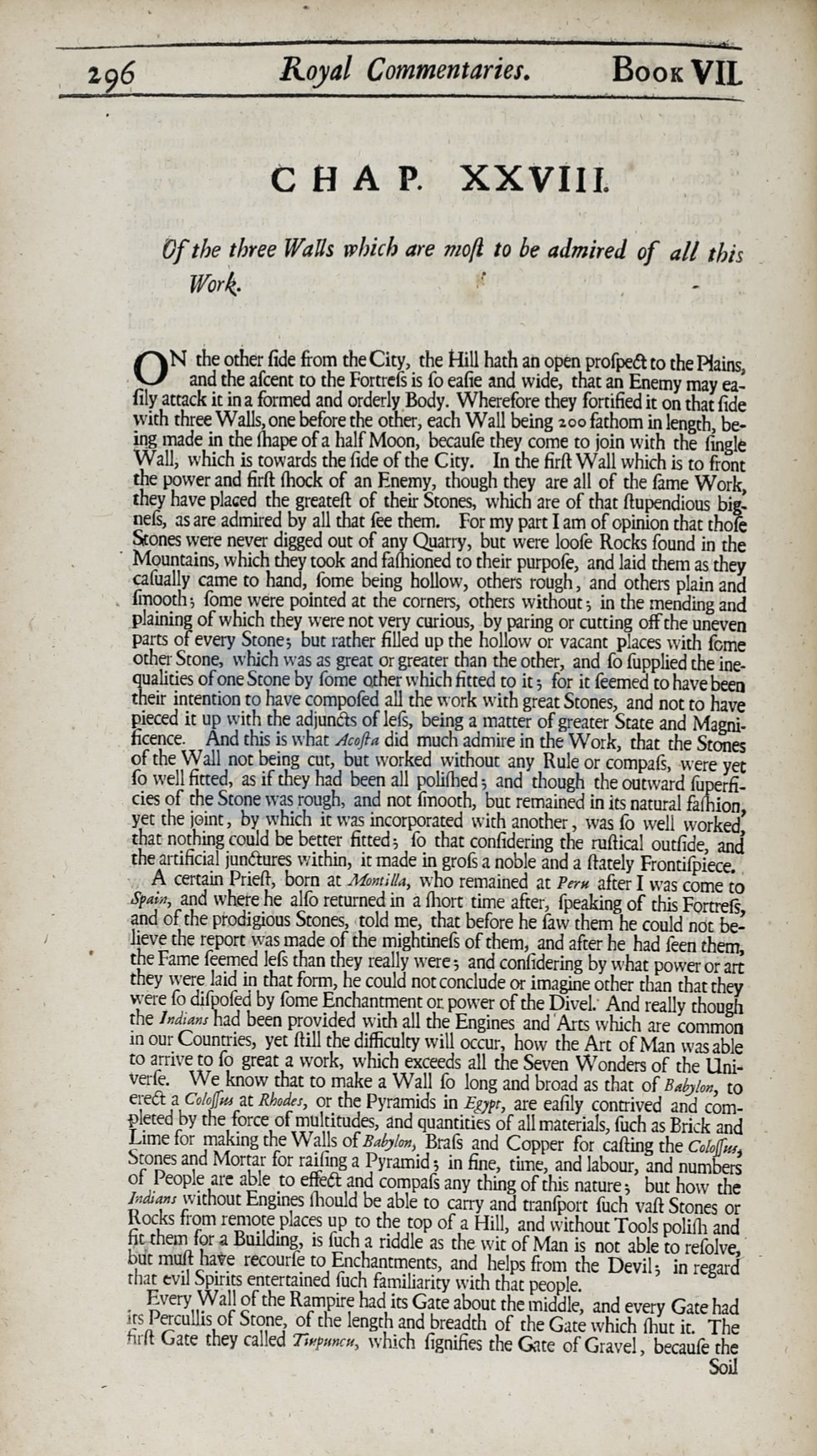

Royal
Commentaries.
CH A
P.
XXVlll
Ófthe three WaOs which are moft to be admired of ali this
Wor4.
.
/
,
·
,
-
··
O,
N che ocher fide from che Cicy, the
1-Iill
hath ah opén profpeét to the Pfains,
.
and che afcent to the Fortrefs
is
fo
eafie and wide, that an Enemy rnay
ea.
fily attack it in a formed and orderly_Body. Wherefore they forcified
it
on that fide
wich threeWalls, one before che other¡ each Wall being
1.00
fachom
in
length, be–
iQg rnade in che íhape ofa halfMoon, becaufe chey come to join with che fmgle
Wall; which
is
cowards che fide of che Cicy.
In
the firíl: Wall whiéh ifto front
the power and firíl: íhock of an Enemy, though they are all of che fame
W
ork,
they have plaaed che greateíl: of their Stones, which are of that íl:upendious big.
·nefs, as are admired by all that fee them. For rny par-e I am of opinion thac chofe
Stones were never digged out of any Quarry, bue were loofe Rocks found in che
· MQuntains, which they took and faíhioned to their purpofe, and laid chem as chey
cafually carne to hand, forne being hollow, others rough, and ochers plain and
, finooch; fome were poinced at che corners, ochers wichout; in the mending and
_plaining of which chey were not very curious, by paring or cutting offche uneven
parts ofevery Stone; bue racher filled up che hollow or vacanc places with fome
other Srone, which was as great or greacer than che other, and fo fupplied che ine–
qualicies ofone Stone by forne Qther which fitted to it; for it feerned to have
been
their intention to have compofed ali che work with great Stones, and not to have
pj.eced ic up with che adjunéls of lefs, being a matter of greater Scate and Magni–
ficence. And chis is whac
Acofta
did much admire in che Work, that che Stones
of the WaU not being clic, bue worked withoue any Rule or compafs, -were yet
fo
well fitted, as if they had been ali poliíhed; and though che outward fuperfi–
cies of che Stone was _rough, and not finooch, bue remained in
lts
natural fafhion,
yec che j0int, by which it was incorporated with another, was
fo
well worked,
1;hat,nothing could be better fitted; fo thac confidering che r_µfücal outfide, and
che artificial junétures withio, ic made in grofs a noble and a fiately Frontifpiece. ,
·. A certain Prieít, born at
Montilla,
who remaioed ac
Peru
after I was come to
Spai-11,
aod whete·he alfo remrned in a füort time after~fpeaking of this Forcrefs,
and.ofche pr~digious Stones, ,told mej thac befare he faw them he could ndt be–
,Jiev~ che report w'as made of the mightinefs oftben,, and afcer he had feert them,
the Fame feemed lefs than they really were; and confidering by what power orare
they were laid in thac form, he could noc conclude or imagine ocher chao that they
were fo d¡fpofed by fome Enchantment ot power of the Divel: And really though
the
lndians
had been provided wich ali the Engines and
'Arts
which are common
in our Countries, yec füll che difficulty will occur, how the Are ofMan was able
to arrive to fo great a work, which exceeds all the Seven Wonders of che Uni–
verfe.
\Ve know that to make a Wall
fo
long and broad as thac of
Bt1bylo11,
to
ereét a
Colof{m
at
Rhodes,
or che Pyramids in
Egypt,
are eafily concrived
and com–
pleced by che force of multitudes, and quantities of all matedals, fuch as
Br.í.ckand
Lime for making che Walls of
Babylon,
Braís and Copper for caíl:ing c
he Co!o[JU1
1
Scones and Mortar for raifing a Pyramid; in finej time, and labour, and numóers
of People are able to effeél: and compafs any thing of chis nature; bue how
che
Jndians
withoue Engines fhould be able to carry and tranfpott fuch vafi: Stones or
Rocks from remoce places up to the top of a Hill, and without Tools polifh and
ijt..them for,a Building, is fucha riddle as the.wic of Man is not able to refolve; ·
bue muíl: have recourfe
to
Enchantments, and helps from che Devil; in regará
rhat c:vil Spirits eritertaioed fuch familiarity with that people.
Every Wall ofche Rampire had its Gace about the middle, and every Gate had
irsPercullis of Stone, of che lengch aod breadch of che Gace which íhut it. The
'fo-ft.
Gate chey called
TiP-p1mcu,
which íignifies che
Gme
of Grave!, ·becau[e che
Soil














